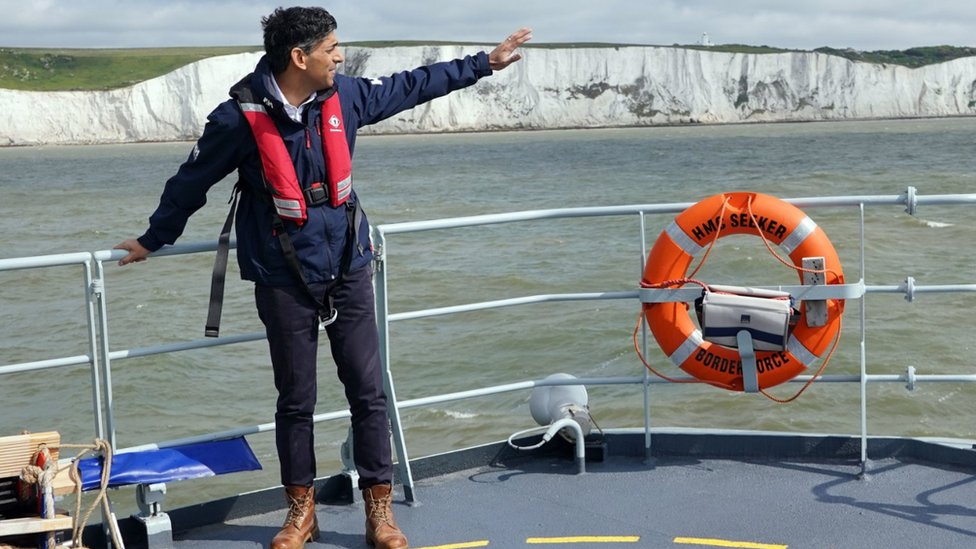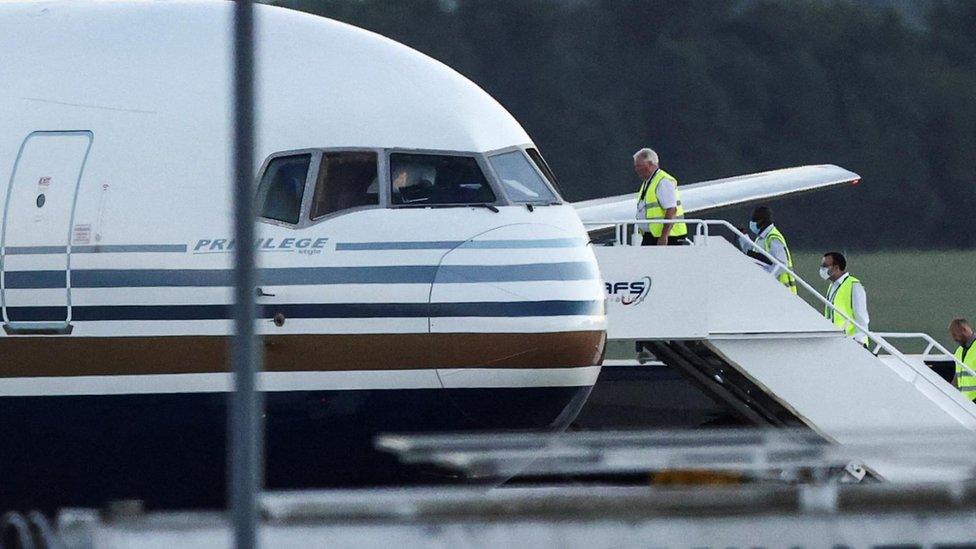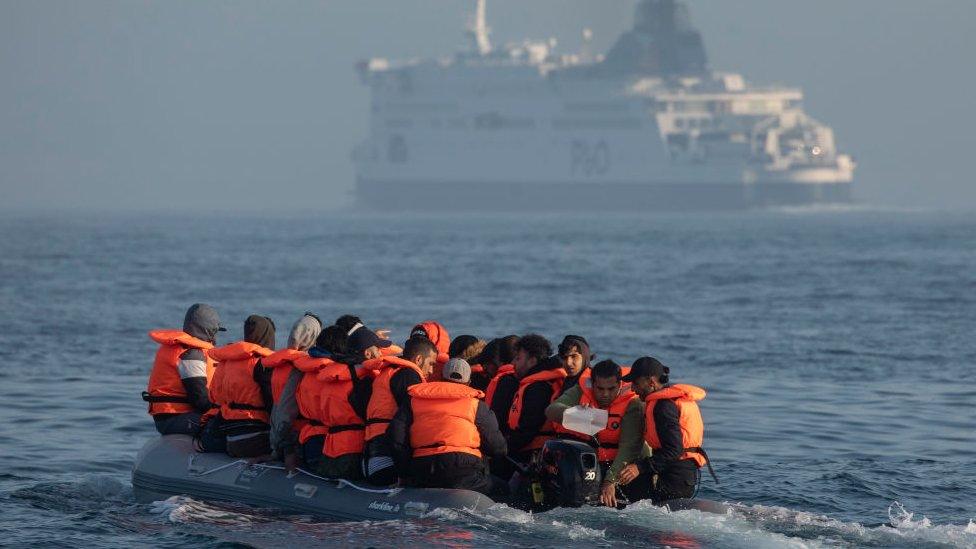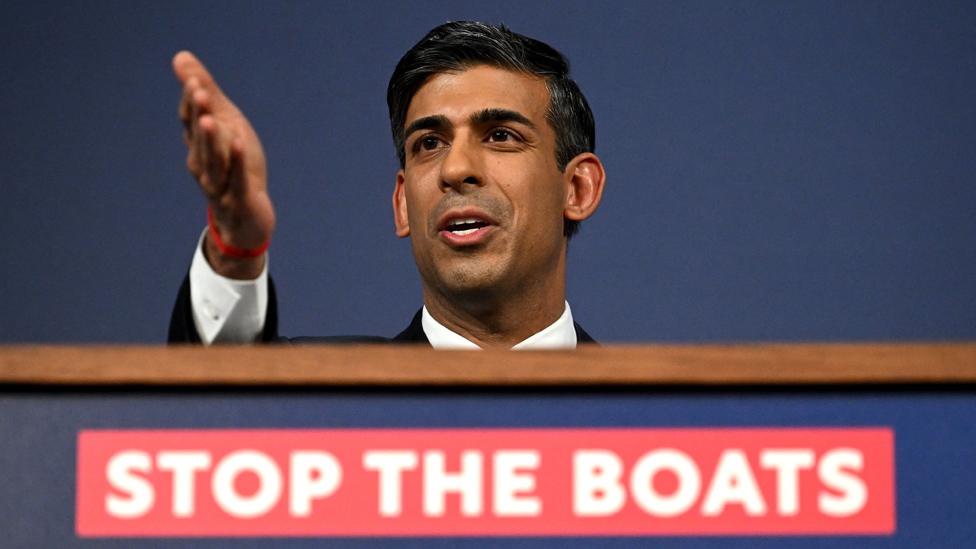Fresh Lords battle looms over Rwanda bill amendments
- Published

Prime Minister Rishi Sunak on a trip to Dover to promote his Stop the Boats policy
The government's Rwanda deportation bill could face a further delay, after Labour vowed to try and change it again in the Lords.
On Monday, MPs voted down 10 amendments to the draft law proposed by the House of Lords earlier this month.
But Labour peers will try and reinsert five or six of the proposed changes when the bill returns to the Lords on Wednesday, the BBC has been told.
It means the bill might not become law until after Parliament's Easter break.
This could threaten Downing Street's ambition of getting the first flights to the east African country off the ground before June.
The proposed law aims to ensure the UK can deport asylum seekers to Rwanda by declaring it to be a safe place, after the Supreme Court ruled last year it could lead to human rights breaches.
Earlier this month, peers added changes to the bill to make it easier for judges to challenge this, and ensure the treaty underpinning deportations is "fully implemented" before flights take off.
These were rejected in a series of votes on Monday evening, with government majorities ranging from 57 to 78.
The bill will now return to the Lords on Wednesday in a process known as "ping pong," where MPs and peers will try and agree the final wording, as the bill is batted between the two Parliamentary chambers.
Labour has suggested its peers will not seek to block the bill's passage into law completely.
However, the party will order them to try again to reinsert amendments designed to prevent flights taking off until the UK has more assurances that Rwanda is a safe country.
If they fail, the bill could become law by the end of this week. But if they succeed, the bill would have to return to the Commons once again.
Prime Minister Rishi Sunak's spokesperson urged peers to "work with the government" at the votes on Wednesday to help "end the business of people smuggling".
'Frustrate and delay'
Another vote would probably have to wait until MPs return from their Easter break on April 15, potentially delaying any flights by several weeks, unless the government clears the Commons schedule to allow votes next week.
Labour says each deportation will cost as much as sending six people to space.
Michael Tomlinson, Home Office minister, told the Commons on Monday that the Safety of Rwanda (Asylum and Immigration) Bill was "an essential element" of protecting the UK's borders.
He said that the bill did not conflict with the government's international obligations.
Mr Tomlinson also criticised "systematic legal challenges" that he said continued to "frustrate and delay" removals.

Legal challenges meant the first Rwanda flight was cancelled shortly before take-off in June 2022
During the votes on Monday, Labour's Stephen Kinnock supported all the Lords amendments to the bill and said peers were fulfilling their "patriotic duty" by scrutinising the draft laws.
The shadow Home Office minister said the government must have "due regard" for the Supreme Court ruling and claimed Conservative MPs were pushing through "absurd legislation" that is "frankly turning our institutions into a laughing stock".
Labour backbencher Neil Coyle asked whether Mr Tomlinson was aware of the National Audit Office findings showing that the scheme could cost taxpayers nearly £2m for each of the first 300 asylum seekers sent to Rwanda.
"Is the minister aware that Virgin Galactic can send six people into space for less than this government wants to spend sending one person to Rwanda?" he said.
"Is it not time to rethink this absurd policy and extortionate cost?"
A Virgin Galactic flight to the edge of space for six people was costed at £2.14m last summer.
Tory backbencher Richard Graham replied that critics of the cost "entirely miss the point" that it would act as a "huge disincentive" to those wishing to enter the UK without genuine reason.
However Robert Buckland, a former justice secretary, was one of a few Conservative rebels to support some of the Lords' amendments, saying he was concerned about "creating legal friction" over whether Rwanda was and continued to be a safe destination.
Sir Robert was also keen to stress his support for an amendment exempting those who had helped the UK's armed forces, such as Afghan translators, from deportation to Rwanda.
He said: "I would expect the government to be very sensible and sensitive to the position of Afghan refugees and future refugees and not put them into this scheme, it does seem to me to lose nothing by adding this particular insertion."
Related topics
- Published27 June 2023

- Published14 February 2024

- Published6 March 2024

- Published12 February 2024
